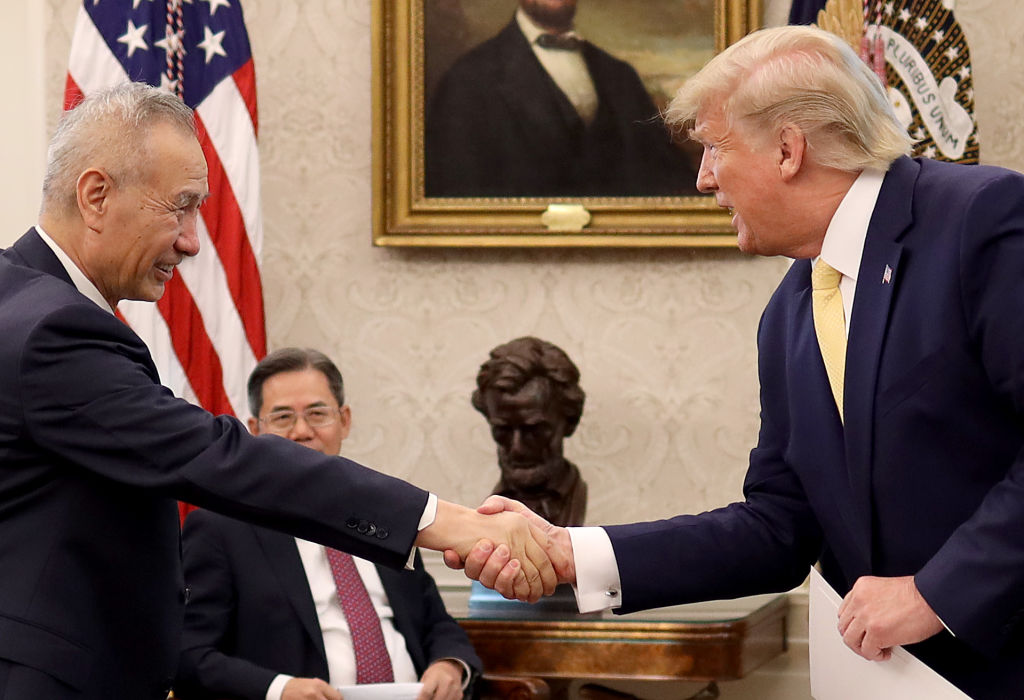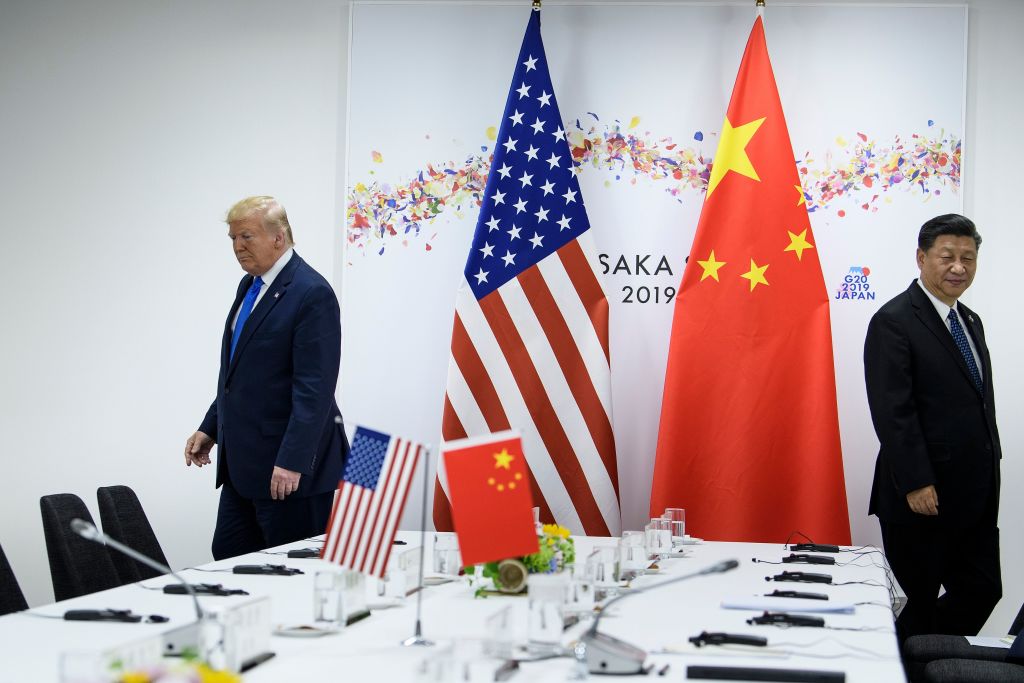福克斯电视台主持人玛利亚·巴蒂罗姆批评唐纳德·特朗普政府“夸大”了与中国的新贸易协定,称“中国人得到了他们想要的”,而美国得到的回报很少。
“别忘了,财政部[司]多年来一直在夸大这笔交易的细节,”巴蒂罗姆在周一指出玛丽亚的早晨。她指出,特朗普的财政部长史蒂文·穆努钦(Steven Mnuchin)“一年前站出来说,‘哦,我们90%在那里,90%在那里’,结果却发现他们根本不亲密。”
上周与中国国务院副总理刘和谈判后,特朗普告诉记者北京和华盛顿达成了“非常实质性的第一阶段协议”,以解决正在进行的贸易战。总统断言,在第一阶段签署后,“第二阶段将几乎立即开始”。
特朗普称该协议对农民来说是“巨大的”,称该协议将解决知识产权和金融服务方面的担忧,而中国也将从美国购买价值约400亿至500亿美元的农产品。作为回报,特朗普政府同意推迟针对中国进口商品的新一轮高额关税,该关税定于周二生效。

10月11日,唐纳德·特朗普总统在宣布与中国达成“第一阶段”贸易协定后,与中国国务院副总理刘和握手。
尽管特朗普政府吹捧这项交易是美国的胜利,但巴蒂罗姆和其他分析师对此表示怀疑。与此同时,据报道,中国呼吁在签署任何协议之前进行新一轮的贸易谈判,根据CNBC的说法这表明该协议并不像白宫声称的那样稳固。
“大多数大问题都没有通过这种方式得到解决。我们仍然有一个悬而未决的问题:中国人是否会窃取知识产权。技术的强制转让毫无意义。基本上,在我看来,中国人得到了他们想要的,”经常为特朗普及其政府辩护的巴蒂罗姆在周一的节目中说。
她后来坚称,她并没有“相信”这笔交易对美国来说是一场胜利的想法。“我认为他们仍然希望看到市场反弹并保持冷静,所以他们告诉我们,我们很接近了,我们很接近了,”她辩称。"但是总统在大件物品方面一无所获。"
投资者已经表示,他们对所谓的第一阶段“协议”不太满意。
摩根士丹利(Morgan Stanley)分析师在给客户的一份报告中写道:“目前还没有降低现有关税的可行途径,关税升级仍然是一个有意义的风险,Axios报告。“因此,我们还不认为企业行为会出现有意义的反弹,从而推高全球增长预期。”
Axios称,摩根大通股票分析师也持类似的负面观点。他们表示:“在会议前几周,投资者对某种形式的小型交易抱有很高的期望,周五的声明至少部分(如果不是全部)被计入了价格。”。分析师断言,该协议不太可能对放缓的美国服务和制造业产生重大积极影响。
中国官方媒体也表示谨慎,称双方还不应该开始庆祝。
“虽然谈判似乎确实就关键问题和友好关系的更广泛利益达成了基本谅解,但香槟可能应该保持沉默,至少在两国总统签署协议之前是这样,”中国日报 在周日的社论中写道。

6月29日,在日本大阪举行的20国集团峰会期间,唐纳德·特朗普总统和中国习近平主席出席了一次双边会议
特朗普去年发起了对中国的贸易战,对数十亿美元的中国进口商品征收新关税。中国也做出了同样的回应,双方都在稳步采取额外措施提高关税,并在经济上相互报复。尽管谈判有时取得进展,但在特朗普和他的政府暗示这些问题接近解决后,谈判经常陷入僵局。
与此同时,世界两大经济体之间的贸易争端已经在全球产生了连锁反应。在国内,特朗普政府已经在拯救农民的努力,他们在这场争端中受到的打击最大。中国此前购买了大量美国农产品,但随着关税的增加,中国买家已经找到了新的市场。
就全球影响而言,国际货币基金组织总裁克里斯蒂娜·乔治娃上周警告过这场争端“可能意味着到2020年损失约7000亿美元”她还指出,中美之间的紧张关系是今年全球近90%地区“[经济”增长放缓的一个关键因素。
FOX BUSINESS HOST SAYS TRUMP 'OVERSELLING' TRADE DEAL WITH CHINA: 'THE CHINESE GOT WHAT THEY WANT'
Fox Business host Maria Bartiromo criticized President Donald Trump's administration for "overselling" a new trade agreement with China, arguing that "the Chinese got what they want" while the U.S. got very little in return.
"Let's not forget, the Treasury [Department] has been overselling details of this deal now for years," Bartiromo pointed out Monday during Mornings With Maria. She pointed out that Trump's treasury secretary, Steven Mnuchin, "came out a year ago and said, 'Oh we're 90 percent there, we're 90 percent there,' only to find out that they were not close at all."
After negotiations last week with Chinese Vice Premier Liu He, Trump told reporters that Beijing and Washington had reached a "very substantial phase one deal" to resolve the ongoing trade war. "Phase two will start almost immediately" following the signing of the first phase, the president asserted.
Classifying the deal as "tremendous" for farmers, Trump said the agreement would address intellectual property and financial services concerns, while China would also purchase some $40 billion to $50 billion worth of agricultural products from the U.S. In return, the Trump administration agreed to hold off on a new round of hefty tariffs targeting Chinese imports, which had been set to go into effect on Tuesday.

President Donald Trump shakes hands with Chinese Vice Premier Liu He on October 11 after announcing a "phase one" trade agreement with China.
While the Trump administration has touted the deal as a win for the U.S., Bartiromo and other analysts are skeptical. Meanwhile, China has reportedly called for a new round of trade talks before it signs any agreement, according to CNBC, which suggest that the deal is not as solid as the White House has claimed.
"Most of the big issues have not been resolved by this. We still have the open question of whether or not the Chinese are going to steal intellectual property. The forced transfer of technology is nowhere. Basically, to me it looks like the Chinese got what they want," said Bartiromo, who often defends Trump and his administration, on her Monday show.
She later asserted that she wasn't "buying" the idea that the deal was a win for the U.S. "I think they continue to want to see markets rally and stay calm, so they tell us we're close, we're close, we're close," she argued. "But the president has gotten nothing in terms of the big-ticket items."
Investors have already signaled they are less than impressed with the so-called phase one" agreement.
"There is not yet a viable path to existing tariffs declining, and tariff escalation remains a meaningful risk," Morgan Stanley analysts wrote in a note to clients, Axios reported. "Thus, we do not yet expect a meaningful rebound in corporate behavior that would drive global growth expectations higher."
JPMorgan Chase equity analysts had a similarly negative perspective, according to Axios. "Investors had high hopes for some form of mini-deal in the weeks before the meeting, and Friday's announcement has at least been partially, if not fully, priced in," they said. The agreement will not likely have a significant positive impact on the slowing U.S. service and manufacturing sectors, the analysts asserted.
Chinese state media also voiced caution, saying both sides shouldn't start celebrating yet.
"While the negotiations do appear to have produced a fundamental understanding on the key issues and the broader benefits of friendly relations, the Champagne should probably be kept on ice, at least until the two presidents put pen to paper," China Daily wrote in a Sunday editorial.

President Donald Trump and China's President Xi Jinping attend a bilateral meeting on the sidelines of the G-20 Summit in Osaka, Japan on June 29
Trump launched the trade war with China last year, adding new tariffs on billions of dollars of Chinese imports. China responded in kind, and both sides have steadily taken additional measures to increase tariffs and retaliate against each other economically. Although talks have made progress at times, they have regularly stalled after Trump and his administration have suggested the issues were close to being resolved.
Meanwhile, the trade dispute between the world's two largest economies has had ripple effects across the world. Domestically, the Trump administration has spent nearly $30 billion in an effort to bail out farmers, who have been among the hardest hit by the dispute. Significant amounts of U.S. agricultural products had previously been purchased by China, but with the addition of tariffs, Chinese buyers have sought out new markets.
In terms of the global impact, International Monetary Fund Managing Director Kristalina Georgieva warned last week that the dispute "could mean a loss of around $700 billion by 2020." She also pointed to the tensions between China and the U.S. as a key factor behind "slower [economic] growth in nearly 90 percent of the world" this year.






